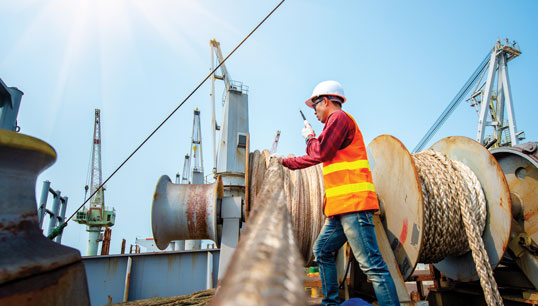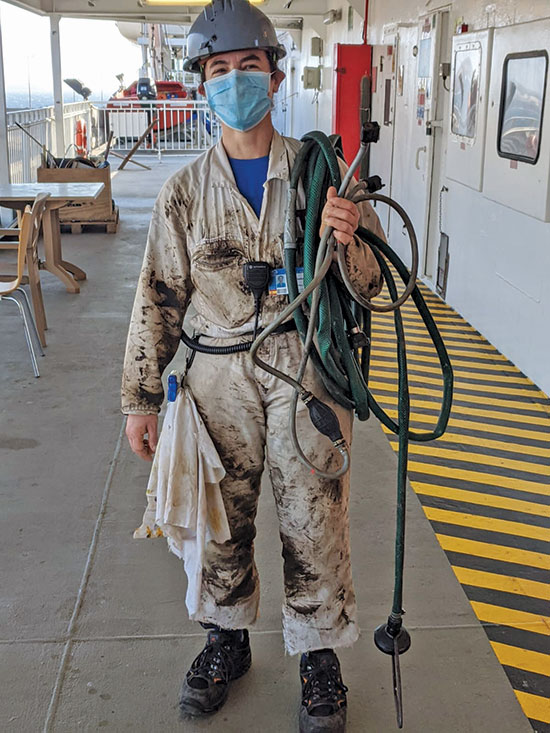- Topics
- Campaigning
- Careers
- Colleges
- Community
- Education and training
- Environment
- Equality
- Federation
- General secretary message
- Government
- Health and safety
- History
- Industrial
- International
- Law
- Members at work
- Nautilus news
- Nautilus partnerships
- Netherlands
- Open days
- Opinion
- Organising
- Podcasts from Nautilus
- Sponsored content
- Switzerland
- Technology
- Ukraine
- United Kingdom
- Welfare

This year of exceptional challenges has exposed long-standing weaknesses in the global maritime industry and its relationship to governments. It's time for an urgent review of the state of shipping, says Nautilus, which has produced a briefing document for governments and MPs
With the end of the Brexit transition period looming, and no resolution in sight for the Covid-19 pandemic, the UK and European governments need to give some serious thought to the state of the maritime industry.
That is the message of a new Nautilus briefing document for governments and MPs.
Lauded as key workers in some countries during the pandemic, seafarers have now been left particularly vulnerable to job insecurity and financial difficulties by the way the industry has been managed over many decades.
Shipping was ill-prepared for this time of crisis, and governments must now make the industry more resilient, to ensure supply lines are kept open whatever the threat.
The moment has come to address employment practices that would be unacceptable in many land-based industries, and for individual countries such as the UK to achieve a much higher and shipping.
Flag state responsibilities
The crew change crisis has revealed deep-rooted structural problems in the practice of registering vessels in so called 'flags of convenience' (FOCs).
Of the top 10 ship registers, five are flags of convenience (Panama, Marshall Islands, Liberia, Malta, and Bahamas) and the top three are all FOCs. These flag states have shown how the abuse of the ship registration system undermines the governance and regulation of the industry. Their utter inability to fulfil their obligations to seafarers on their vessels under international law has been brutally exposed by the pandemic.
This presents an opportunity for reputable governments to show leadership. There has been global condemnation of the practices of FoCs, notably Panama's decision to allow seafarers to remain onboard for up to 17 months (later withdrawn due to public outrage).
It should trouble responsible governments that shipowners who register their ships or companies in such jurisdictions still expect support from their nation state in times of crisis.
International standards
The ease with which governments the world over were able to ignore the fundamental rights of seafarers during the pandemic is of profound concern to Nautilus. Ships were refused entry to ports and seafarers were denied shore leave and medical attention, even for urgent conditions.
Repatriation of seafarers was blocked, and they were unable to join their vessels. All this despite a plethora of international conventions guaranteeing fundamental rights to ships and seafarers to facilitate global trade, safety of life at sea and the protection of the marine environment.
It is important to recall that the UK and the Netherlands were quick to signal that crew changes for seafarers, as key workers, would continue. The Netherlands went on to facilitate the most successful crew changes globally during the height of the pandemic.
As leading maritime nations, the UK and the Netherlands should be extremely concerned that others did not follow suit, and that seafarers have essentially been forced to continue to work way beyond what could reasonably be considered humane.
The maritime industry is complicit in 'sea blindness' to avoid scrutiny of employment and business practices which do not support the national interest
Economic impact
The true scale of the economic damage the Covid-19 coronavirus has done to global, regional and national economies is becoming clear. With the World Trade Organization (WTO) and World Bank predicting a global slump in trade greater than the financial crisis of 2008, a survey by the European Community Shipowners' Associations (ECSA) found that shipping company turnover is set to decrease by more than 60%, with the hardest hit sectors being cruise, ferry, car carriers and offshore services.

Maritime professionals at work: cargo handling. Image: Danny Cornelisson
With such a heavy toll on financing and employment, the industry does not expect to return to pre-crisis levels of activities in 2020, and the employment of seafarers is expected to sharply decrease in the longer term.
However, and perhaps counterintuitively, the global shortage of seafarers is set to continue, according to shipping consultancy Drewry.
The current deficit amounts to around 2% of international demand for officers and is expected to increase from around 11,000 at present to 17,000 by the start of 2025.
Alongside this, the UK-EU transition arrangements will end in December 2020.
The UK will either have negotiated a future trade agreement or fallen back on WTO arrangements.
The implications of this are not fully understood.
Issues of concern include: the continuation of state aid to shipping and the maintenance of a level playing field with the EU in terms of health, safety and environmental standards; the mutual recognition of certificates of competency; and the coordination of social security protection for the nearly 4,000 UK officers who work on EU-registered vessels.
UK seafarers
Measures taken by global governments in response to the pandemic have caused a major crew change crisis for tens of thousands of seafarers. UK seafarers have not been immune. Although exact numbers are hard to estimate, several thousand were either stuck onboard their vessels or at home unable to join their vessels.
This has had several consequences. Many UK seafarers faced a financial triple whammy: unable to have their employment protected via the Coronavirus Job Retention Scheme (CJRS) as their employer was not eligible; unable to claim income support via the self-employed scheme (SEISS) as they declare foreign earnings to HMRC; and unable to work due to travel restrictions and thus unable to qualify for the Seafarers Earnings Deduction (SED).
In July 2020, the UK treasury confirmed it was unwilling to provide any support to these seafarers or waive the eligibility criteria for SED and those seafarers now face the prospect of a huge unexpected tax bill next year.
Employment status
The employment status of most UK seafarers has left them exposed during the pandemic. Those who were fortunate enough to have an eligible employer were furloughed under the CJRS. These were a minority, as Nautilus estimates that up to 11,000 UK seafarers were left without the government support afforded to other workers.

The UK treasury has confirmed it has no intention of extending seafarers any support beyond that available to the general population, such as Universal Credit, despite seafarers being essential for the economic restart and recovery process.
Nautilus is concerned that this unwillingness to assist UK seafarers derives in part from their 'invisibility'. UK seafarers are atypical workers, often employed under contracts in overseas jurisdictions via agents, which means that the ultimate employer is not liable for National Insurance contributions. It is time this practice, tacitly endorsed by successive governments, was ended and seafarer employment contracts brought back onshore.
The UK government must recognise that the dislocation of ship ownership and ship registration has undermined the rights of seafarers. The dominant FoC ship registers have no legislative clout and no diplomatic outreach.
The need for review
Nautilus maintains that there is a need for a thorough and comprehensive review of the structure of the global shipping industry and its employment practices.
Whilst the maritime industry often complains about the levels of 'sea blindness', it is complicit in hiding the industry away to support its arguments for exemptions and special treatment. This low profile allows the industry to avoid scrutiny of employment and business practices which ultimately do not sufficiently support the national interest.
Nautilus believes the shipping sector needs to be brought out into the open with a full and transparent review of ship registration practices, training and employment policies, and of how the fiscal support provided is linked to the employment and training of seafarers and to the registration of ships on national ship registers.
Recommendations
Nautilus is urging governments to work with unions and shipowners to address the state of the maritime industry and its resilience. The Union makes the following recommendations:
- Call for a global review of ship registration practices to tighten up ship registration and reinforce UNCLOS Article 94, which requires a genuine link between the shipowner and the country of registration.
- Call for a global review of the ineffectiveness of international regulations in light of the Covid-19 pandemic when port states and flag states ignored the fundamental rights of seafarers in a way which was tantamount to forced labour.
- Initiate a global discussion on the need for a reflection on the impact of the pandemic on seafarers and on shipping with a view to strengthening the adherence to and enforcement of international conventions.
- Review the provision of state aids to the shipping industry from the perspective of employment costs which does not necessitate 'offshore employment'.
- Ensure that the needs of the maritime industry and seafarers are included in discussions on the future relationship between the UK and the EU.
- Ensure the promotion and maximisation of UK employment in the UK shipping industry is part of all strategies to grow UK shipping.
- Review the practice of 'offshore employment' and make recommendations on the desirability of seafarers being required to have contracts of employment that fall under the jurisdiction of the UK.
- Review the UK government's policy of supporting the Red Ensign Group and develop a coherent flag registration policy which is consistent with its obligations under the United Nations Convention of the Law of the Sea (UNCLOS) and which supports the government's stated aim of growing the UK Ship Registry.
A UK-focused briefing document on the matters covered in this article has been sent by Nautilus to the British government and MPs. It available to download in full from the Resources section of the Nautilus website.
Tags
More articles
Nautilus Slater Fund gets £450K boost for officer of the watch training
The UK's maritime resilience in the light of the Covid-19 Pandemic
The UK's maritime resilience in the light of the Covid-19 Pandemic
